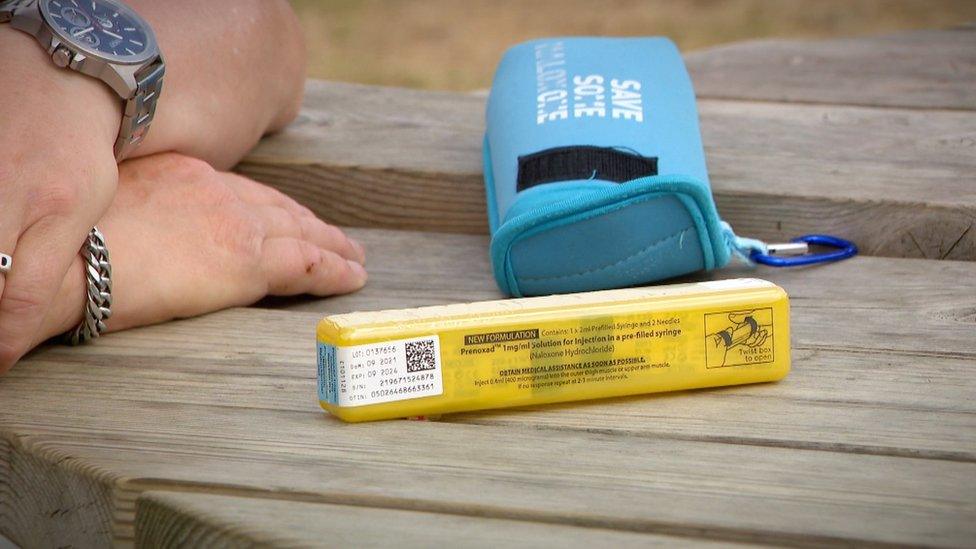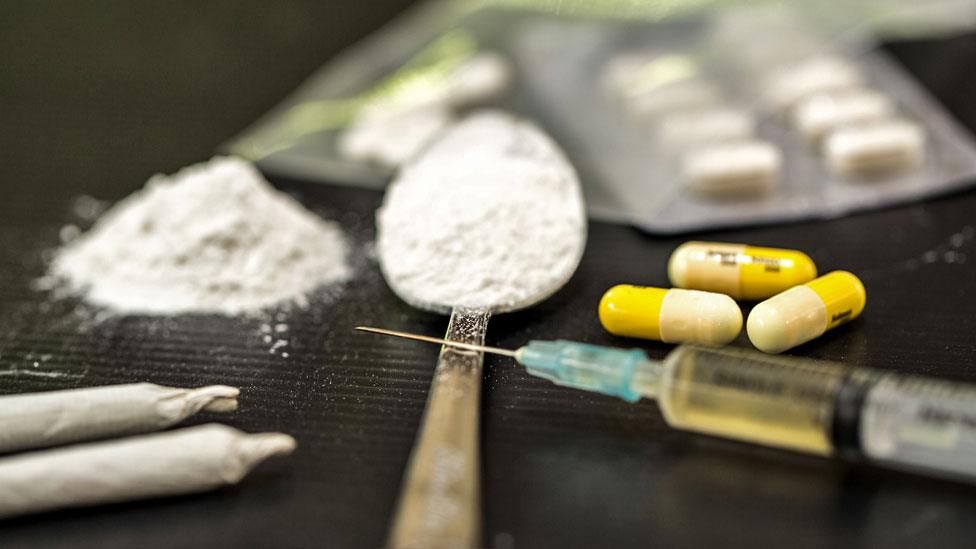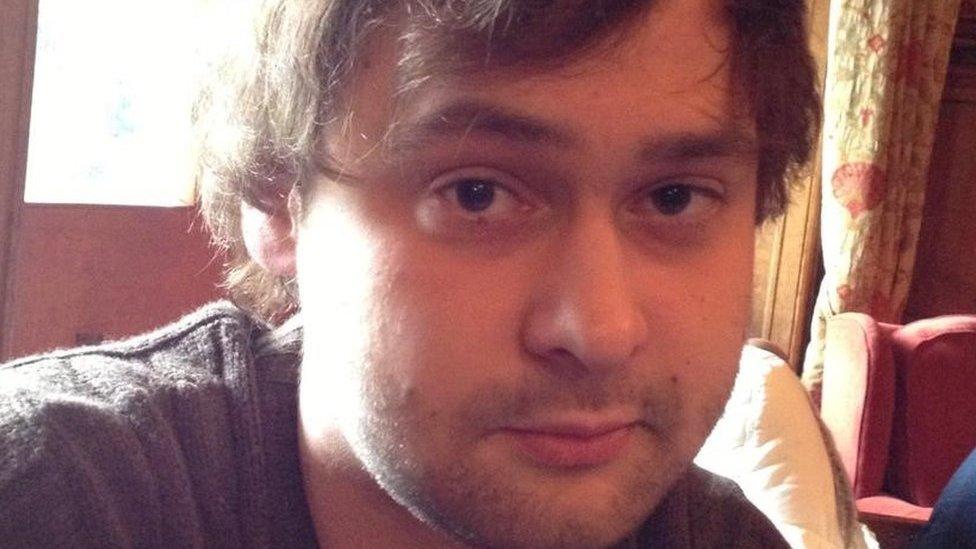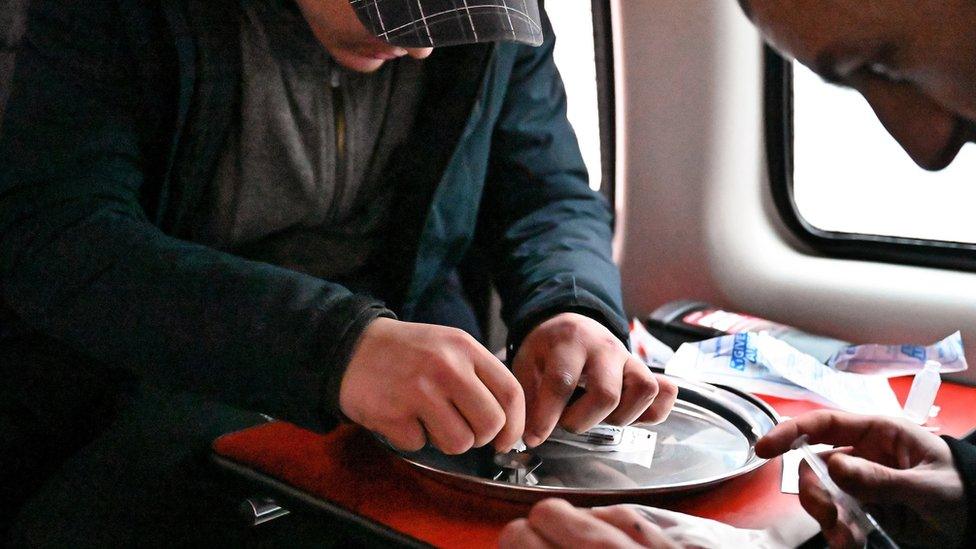Addict saved from overdoses nine times in one year
- Published
Recovering drug addict, Kevin, says:"It was horrible getting revived."
The latest statistics on drug-related deaths in Scotland show the number of people who died last year dropped slightly to 1,330 - the first decrease in eight years. However, Scotland continues to have by far the highest drug death rate in Europe. Here, one recovering addict tells of his near death experiences.

At the peak of his addiction, Kevin said he was taking between 300-350 street Valium pills per day.
This was on top of a mixture of cocaine, heroin and crystal meth.
The 49-year-old was homeless, sometimes sleeping in hostels in Glasgow, and had lost contact with his family.
He estimates he has been saved from overdose at least nine times in 2021.
"I was using quite a lot, more than most in the city centre to be honest," he said.
"Some of them were uppers. Some were down. The smack was just to keep me level. The cocaine, I liked the rush. The street Valium I took because they made me forget everything.
"To be honest I didn't want to be here."
Kevin was revived by volunteers mostly from providers of homelessness services in the city, such as the Simon Community and Glasgow City Mission.
They were equipped with the treatment naloxone - a nasal spray which can reverse the effects of an opioid overdose.
Paramedics and police officers are now issued with the spray while firefighters are currently being trained how to use it.
But it is becoming more widely available as part of the Scottish government's fight against drug deaths.
Who can administer naloxone?
The number of kits issued by the national naloxone programme in Scotland has increased in recent years - 22,366 in 2020/21, up 67% on the 13,414 the previous year.
In total, 94,170 kits had been issued by the programme at the end of 2020/21, according to figures from Public Health Scotland, external.
In addition to the emergency services and families affected by drugs, the treatment is available in a number of settings, including:
community pharmacies
homeless shelters
alcohol and drug services
youth organisations
community hubs
outreach support
justice services
women's support organisations
advocacy services
housing support
health clinics
Developing an extensive naloxone network was one of the key recommendations set out by Scotland's drug deaths taskforce in its final report.
The problem for people like Kevin, is that while naloxone may well save their lives, it can become a sticking plaster.
He said: "It was horrible getting revived. You come out of it feeling strung out and rotten, so you're just automatically away to get another [fix].
"I've since learned that that could be the reason I was overdosing all the time. Although naloxone brings you out of it, the drugs are still in your system - so as soon as you get something else, you collapse again."
'A reason to want to get straight'
For Kevin and many other addicts, living through the Covid-19 pandemic while homeless was a frightening experience.
He said the he was scared to talk to people and was not ready to engage with support that was being offered to him.
"It got to the extent where I just didn't want to be here," he said. "That's what every addict is chasing - we all think the next one will take us away."
With continued support from the Simon Community, Kevin eventually stopped using illegal substances.
He has been sober for a year with the help of Buvidal (an opiod dependency treatment) and has now become one of the organisation's volunteers - equipped with his own naloxone kit.

Kevin is now issued with a naloxone kit
"The Simon Community was wrap around care for me," he said. "It gave me a reason to want to get straight, to want to keep going, to get my house, to get my life stable, to try and save somebody else.
"Naloxone kept me breathing, the support made me want to live."
Of course, naloxone is not the only tool being used to combat Scotland's drugs crisis.
The drug deaths taskforce has recommended the Scottish government provide better outreach after non-fatal overdoses and backs a public health approach rather than a criminal justice one - which it says penalises addiction.
Drugs Policy Minister Angela Constance said many of the taskforce's recommendations had already been implemented, but there were areas where the Scottish government wanted to go "far further".
She said the Scottish government had announced £1.1m of new investment into public health surveillance projects to improve understanding of harms.
Ms Constance added: "With the backing of an additional £250m over the course of this parliament, we are focussed on delivery and change on the ground, to provide meaningful improvement in people's lives."
Related topics
- Published23 June 2022

- Published1 May 2022

- Published31 August 2023
